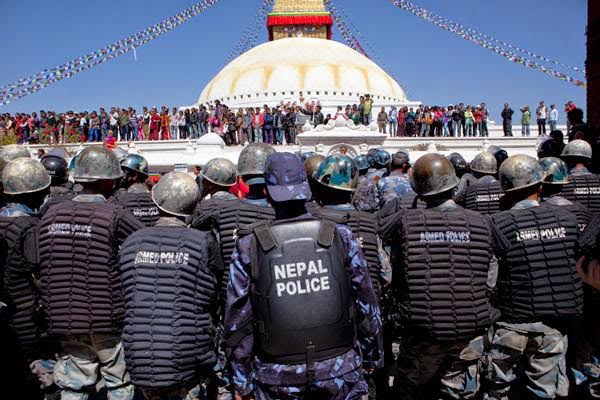
The Asian Human Rights Commission (AHRC) is dismayed by the attempt of the government of Nepal to outsource policing functions to a paramilitary organization. Rather than reform the police, something the nation and its people sorely need, the attempt to allow the Armed Police Force (APF) to take over policing functions and issue arrest warrants is only going to result in more misery for the people of Nepal, especially the majority poor.
The government is seeking to supplant the Armed Police Force Act, 2001, Clause 24, Sub-Clause (2), with the Armed Police Force Regulation 2071, Rule 163. By amending Armed Police Force (APF) regulations, the government wishes to grant the APF power to issue Arrest Warrants. Not only will this move be unconstitutional; it will also contradict international law, including the International Covenant on Civil and Political Rights (ICCPR).
Presently, it is only the Nepal police that are responsible for issuing Arrest Warrants and conducting investigations. This is the usual practice in a democratic setup. The Police Act, 1955, clearly states that the police are responsible for tackling crimes and are responsible for investigating the same. The Government Cases Act, 1992, also authorizes the Nepal police to investigate cases. Allowing APF to issue Arrest Warrants goes against democratic norms, international practice, and the State’s commitment to guaranteeing human rights.
The experience of other South Asian nations, for instance, Pakistan and Bangladesh, where such a step has been taken, granting policing powers to paramilitary bodies, has been clear: when the criminal justice system in a democracy is dysfunctional and the police’s principle form of “investigation” is to extract confession via torture, involving the paramilitary in policing, to “solve” law and order problems that emanate as a result of a collapsed system, will only lead to even greater violence against the very people that most need State protection. The explosion of corruption, extortion, torture, disappearance, and extrajudicial executions that have followed in the wake of the Bangladesh Rapid Action Battalion’s creation and in Pakistan Rangers being assigned responsibility to address target killings in Karachi is an open book that any concerned Nepali should inform themselves about.
In Nepal, the Armed Police Force has been established as an elite paramilitary force to address riots, armed rebellion, and separatist/terrorist activities; protect vital personalities and public facilities; assist with relief work; and guard borders and assist the Nepalese Army in times of an external invasion. Thus, the objective of this elite paramilitary agency is diametrically opposed to the demands of basic civilian policing in a democracy that seeks to guarantee fundamental human rights for all.
Forces created to deal with matters of extreme urgency and serious violence, such as terrorism and riots, and not civilian policing, will naturally be more prone to aggression. It is the public that will suffer further. Additionally, two agencies issuing Arrest Warrants and holding suspects for the same kind of crimes, will not simply cause confusion and breach Clause 13 of the Nepal’s Interim Constitution, with respect to equal protection of every citizen. It will spark a turf war, the signs of which are already apparent, and it will only be the Nepali citizen that will be crushed in between.
A farcical example has been cited as a reason for the move. It has been argued that because the Nepal Police is not able to issue Arrest Warrants on time, it results in the delay of cases, and that having the APF issue warrants will solve the problem of delay. The fact is that delay has become part of the system at all levels, and it is one of the primary factors in the entire system having become a criminal injustice system.
If the idea were to address delays in the justice process, Nepal would need to reform the police, and then move on to the prosecution, and the Judiciary, re-engineering them to work for the common citizen. Ganga Maya Adhikari continues to deny herself food, rotting in a hospital bed at this very moment, demanding that there be justice for the murder of her son. Will the APF getting power over Arrest Warrants bring justice to Ganga Maya?
Whatever the nation needs to do to ensure that parents do not need to starve themselves to death to get the police to investigate independently, the prosecution to prosecute effectively, and the judges to rule impartially and swiftly, is the way forward. All else represents self-interested games of power and pelf, essentially against the citizen.
For starters, if the Nepal police were allowed to begin real modern policing, which shuns torture, and which relies on modern forensic technology to crack cases and control crime, automatically law and order problems will subside. Instead of taking the best step forward in the interests of citizens, Nepal’s leaders appear eager to repeat mistakes made in neighboring South Asian nations that have resulted in States further terrorizing their populations.